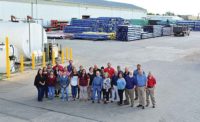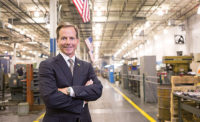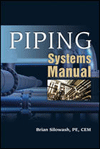2017 Supply House Times PVF Ring of Honor: United Pipe & Steel
United Pipe & Steel keeps evolving.

The United Pipe & Steel Corp. executive team features, from left: Jon Renko (VP Operations), Lee Goldman (IT Director), Noah Heller (VP New Markets), David Cohen (Founder), Greg Leidner (President/ CEO), Corey Lowsky (VP Sales), Joe Kelly (VP Purchasing) and Brian Gibbs (CFO). Photo by Greg Caparell Photography.

United Pipe allows its wholesale customers to mix and match pipe products to meet minimum weight for free shipping. Photo courtesy of United Pipe & Steel.

United Pipe & Steel’s trucks are loaded up for delivery of steel, copper and plastic pipe products. The master distributor has more than 50 tractor-trailers on the road making deliveries out of its 12 distribution centers throughout the U.S. Photo courtesy of United Pipe & Steel.

An aerial view of United Pipe’s Ipswich, Mass., distribution center and corporate headquarters. The company recently opened its 12th DC in Stockton, Calif., and its 13th will go online next year in the Pacific Northwest. Photo courtesy of United Pipe & Steel.




A lot has changed in 10 short years for Ipswich, Mass.-based commodity pipe master distributor United Pipe & Steel Corp.
When President/CEO Greg Leidner joined the company in 2007, the company had two distribution centers with a third in the process of going on line.
Today, United Pipe & Steel has exploded to 12 distribution centers throughout the United States with a 13th earmarked for the Pacific Northwest in 2018. United Pipe & Steel, which founder and current board member David Cohen sold to private equity in 2013, today employs 180 individuals and stocks products in one-million-plus square feet of storage space and 70-plus acres of outside pipe yards in its DCs. Annual revenue at the master distributor, which does business in the main categories of steel, copper, plastics and electrical, checks in at around $275 million, Leidner notes.
While United Pipe & Steel’s continued national expansion is impressive (by 2018, three DCs will have opened up and down the Pacific coast in the last three years), so is its laser focus on helping its customers’ bottom lines through innovative initiatives and programs. The company’s forward-thinking, customer-first mindset is the reason it is the newest inductee into the Supply House Times PVF Ring of Honor.
The PVF Ring of Honor award, established in 2014, is given annually to a manufacturer or master distributor (individual or company) that has enjoyed recent success in the industrial PVF marketplace through the execution of progressive and cutting-edge best practices. United Pipe & Steel joins previous winners Industrial Valco (2014), Penn Machine (2015) and Apollo Flow Controls (2016).
The true definition of entrepreneur
If you want a textbook definition of a go-getter and true entrepreneur, sit down sometime with Cohen, whose path to starting United Pipe & Steel traces back to when he was 20 and started working at a steel service center in Everett, Mass. “I told them I was willing to work for free for 30 days to show that I’m capable of whatever they wanted me to do,” he says in the company’s conference room in Ipswich.
Cohen quickly moved up the company ranks, ultimately landing in the sales department. And that’s where the fun really started.
“In a very short period of time, my division, which was basically me and their receptionist, started generating more profits than all the other lines in the company,” he says. “I was 26 years old and responsible for more than 50% of the gross profit that was being generated by this family-owned business that had been around for 50 years. I was a hustler and a strong player.”
Cohen’s good fortunes didn’t last long. One of the owners of the company informed Cohen he was making too much money and fired him. “I went home in cab,” he says.
It didn’t take Cohen long to land on his feet. He made a deal with a local pipe-trading company to sell product to him. Cohen’s initial investment was $5,000. “I was importing 50, 60 and 70 truckloads every month and dropping it off at different ports on the East Coast,” he says. “The first year I did business from the docks, I made a million dollars. That wasn’t enough for me. I built a warehouse and hired my first employee.”
The location of Cohen’s first building was in Everett, next door to the very people who fired him. Cohen ended up buying his old company’s inventory and rented its building. And in 1980 United Pipe & Steel was born. “I sat at the same desk as I had before I was fired,” he says.
Cohen eventually built another location in Lynn, Mass., and later purchased the building where United Pipe & Steel’s current headquarters reside in Ipswich.
Always innovating
United Pipe & Steel’s innovative mindset traces back to Cohen’s early days with the company. He notes he was one of the first to develop dedicated truck routes by town and by day of the week. “These were for 2,000-lb.-minimum orders, which everybody jumped on board because we had copper, steel and PVC — all these product groups,” he explains. “We were competing against mills that sold only plastic or only copper. We were able to develop a huge customer base in New England.”
Cohen later purchased Basco Nipple Works and relocated it to the Ipswich facility. Again, Cohen got creative when it came to Basco’s workforce. “I bought a school bus,” he says. “The bus would be out in front of the place I bought and the shop foreman would drive the employees to Ipswich and at the end of the day bring them back. We had 50 different types of lathes and threading machines and I was able to keep all the people who ran those machines.”
While on paper United Pipe & Steel is a master distributor, Leidner notes its purpose is much more specific. “We exist for a very different reason,” he says. “We are in the inventory replenishment business. There are two key economic drivers for our customers. First, wholesalers carry less inventory because we’re delivering to them more frequently and because they are more frequent smaller deliveries (United has a fleet of 50-plus tractor-trailers making daily deliveries). Second, they are able to reduce their exposure to volatile commodities.”
Thus, United Pipe & Steel goes to great lengths to ensure exceptional service is delivered at all touchpoints during the order and delivery process. “We’re a trucking company, a pipe company and we also play the role of pipe experts in terms of where the market is,” Vice President of Sales Corey Lowsky says. “We move the product around, lessen our customers’ risks to volatility, reduce their inventory levels and provide that regular milk-run delivery.”
Leidner points out customers deal with a United Pipe & Steel employee in every step of the transaction. All truck drivers are United Pipe & Steel employees usually assigned to specific customers to develop long-term rapport. He cites the example of a local Massachusetts distributor that operates out of a basement location. “Our driver along with one of the distributor employees offload the pipe through a small window leading to the basement,” he says. “That’s the level of service manufacturers cannot provide. It makes a difference. Our customers’ business is very similar to our business. They understand the value of providing service to their customers and therefore appreciate the value of the service we provide them.”
Lowsky adds: “Our pipe looks the same as the competitors. Our service differentiates us. We provide exceptional service from the moment you place an order to the moment you receive it.”
United Pipe & Steel also holds true to its long-standing belief of selling its products only through wholesale-distribution. “There is a saying, ‘Wholesale or no sale,’” Director of National Sales Michael Blair says. “We live by that. We’ll even deliver to a wholesaler’s jobsite, which allows them to focus on other things and be more competitive and win more jobs.”
Leidner adds: “It’s a major line we don’t cross. The wholesaler does a lot of things we can’t do for their contractor customers. I’m not going to trip over a nickel to pick up a dollar. We want to preserve our great relationships with wholesale-distributors.”
Expansion ins and outs
When Leidner joined the company he immediately became intrigued by Cohen’s business model. “David had built an extremely successful business model and what I saw was a major opportunity to take that business model and replicate it in various places around the country,” he says.
In addition to the Ipswich location, United Pipe & Steel features locations in Apopka, Fla., Burlington, N.C., Corsicana, Texas, Easton, Pa., Elyria, Ohio, Franklin, Ind., Loves Park, Ill., Pinson, Ala., Rialto, Calif., and Topeka, Kan. The group’s newest location is in Stockton, Calif. (opened Oct. 1), giving it coverage in both Southern and Northern California.
“It’s a tried and tested model different than the usual master-distribution model,” says Noah Heller, the company’s vice president of new markets who has been hard at work on the two new California DCs the last three years. “We’re putting different products on a truck with low FFA (forward freight agreement), free freight and the milk-run deliveries every week. It works everywhere we go. Our customers understand the value and how we are different than manufacturers. It’s been a repeatable model.”
Expansion hasn’t been limited to only physical locations. Lowsky says the company is open to adding new product categories, but only if it makes sense from a strategic sense. For example, United Pipe & Steel added threaded rod and strut 10 years ago and has seen its volume grow double digits each year since. “When we do something, we find vendors who are going to support us with a steady flow of inbound quality product,” he states.
Vice President of Purchasing Joe Kelly adds: “Our products are crucial to our success. We stock products used by plumbing, mechanical, sprinkler, irrigation, waterworks, pool and electrical contractors. That allows us to hit multiple trades in a particular area with repeat business.”
Kelly notes relationships with suppliers also factor into the company’s success. “We are a large buyer and we buy the full breadth of product,” he says. “We buy every day. That smooths out the manufacturers’ production and spikes in demand. We’re the buffer. If there is a job in Manhattan and they need material in the building, where are they going to go? Mill lead times can be four to six weeks and they need it on Thursday. We’re there to serve that type of situation.”
Heller adds: “Our purchasing team does a great job stocking us with material so we have it on the floor when our wholesalers need it.”
Recent enhancements on the technology side also have made a difference. Lee Goldman, the company’s longtime director of IT, notes a switch to the Epicor Profit 21 system has been a game-changer, while Vice President of Operations Jon Renko points out the implementation of the Roadnet transportation management system (that operates with Profit 21 and is the core TMS United Parcel Service uses) has led to greater internal and external efficiencies, particularly when it comes to route mapping.
“We are purely a service-oriented company,” Renko says. “If we can’t serve a company, someone else will. We have to be the best at it and we are because of the sweat and can-do attitude of everybody here.”
CFO Brian Gibbs adds: “All of the investments we talk about are done by looking through the lens of the customer. For instance, we’ve made investments in smaller flatbed trucks to help us with jobsite deliveries so we can go way beyond what the competitors do.”
Leidner says United Pipe & Steel has no plans on slowing down its growth trajectory whether that’s expansion or by implementing strategies designed to best-serve its wide swath of customers (United Pipe & Steel currently has 4,000-plus ship-tos).
“We believe in growing at a measured pace and not biting off more than we can chew,” he says.
And by doing that, United Pipe & Steel has been able to earn a larger piece of the customer pie.
“This company always is willing to look at a better way to do things and embrace new ways of doing things,” Goldman says. “We’re always evolving.”
This article was originally titled “United Pipe & Steel keeps evolving” in the December 2017 print edition of Supply House Times.
Looking for a reprint of this article?
From high-res PDFs to custom plaques, order your copy today!












